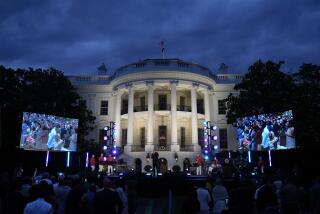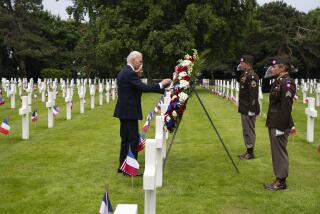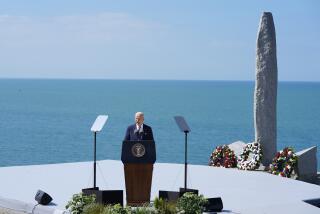Opinion: On this Memorial Day, we look back at war a century ago
There‚Äôs an added poignancy ‚ÄĒ a freshness ‚ÄĒ to Memorial Day observances that come shortly after the end a major war. A century ago, Memorial Day fell just six months after the end of the Great War, which, over time and after another great war, became known as World War I. It‚Äôs quite a world when you can number your global conflagrations. And World War I had been an exceedingly brutal affair, claiming the lives of nearly 117,000 American soldiers ‚ÄĒ more than half of them from illness ‚ÄĒ and an estimated 8.5 million soldiers worldwide.
At the time, it was the largest and deadliest war that the world had endured, except for the 1850-1864 Taiping Rebellion in China. The fighting devastated Europe. It collapsed four monarchies, began to erode the British Empire’s stature as a major world power, left most of the continent deep in debt, helped propel the rise of the Bolsheviks and the Soviet Union, and prepared the ground for fascism in Italy and Germany, which, of course, led to that second great war.
World War I also left the U.S. split over what the nation’s proper role on the world stage should be. The Spanish-American War 20 years earlier was, in a sense, the nation’s coming-out party as an international power, and the ensuing Philippine-American War embroiled us in a precursor of wars to come: insurgents seeking to eject American troops they saw as occupiers.
Yet still the soldiers fight ‚ÄĒ volunteering, in fact, in the current U.S. military system.
But when the U.S. entered World War I three years after it had begun and turned the tide in favor of the Allies, the nation’s global status as a first power was undeniable, even if the American people embraced isolationism in the postwar years until the nation was dragged, again, into a world war.
The war wounds were still fresh on Memorial Day 1919, as were the passions that war engendered. The Los Angeles Times editorial board marked the somber celebration in tones reverential to the dead, but also jingoistic as to American might, and, to put it delicately, oblivious to elements of American history.
‚ÄúNever has an American soldier fallen in a war of conquest,‚ÄĚ the editorial board wrote. ‚ÄúThey have all fought to remove the menace of oppression from the earth, actuated by the ideal that their sacrifice would hasten the day when war and despotism would no longer be possible. The American sword has never been unsheathed except in defense of human rights; it has never propped a tottering throne, never oppressed a neighbor.‚ÄĚ
Wouldst that that were true. The U.S. used its military to ‚Äúpacify‚ÄĚ native tribes as primarily white Europeans and their descendants expanded the nation westward from the Atlantic Coast. The Mexican-American War of 1846-48 was launched after military skirmishes over competing interests in Texas, and it ended with the U.S. taking control of 525,000 square miles of land (half of Mexico‚Äôs prewar territory) covered now by all or parts of California, Arizona, Colorado, Nevada, New Mexico, Utah and Wyoming. That land grab was President Polk‚Äôs intent all along, part of his embrace of Manifest Destiny ‚ÄĒ the notion that the U.S. was God-blessed to rule the Americas from sea to sea. The term was coined, ironically enough, by a newspaperman.
Military confrontations have been a constant in our history, covering wars of necessity but also wars of opportunity. Throughout, the nation has relied on the spirit of the soldiers, even in unpopular wars and extreme circumstances, to do the dirty work, and they have died by the hundreds of thousands not only in battle but also from disease and accidents (of the more than 620,000 deaths in the Civil War, two-thirds resulted from disease).
Remarkably, our war deaths pale compared with that of some other nations. In World War I, Russia counted 1.7 million dead soldiers out of 12 million mobilized troops, with an additional 7.5 million wounded, missing in action or taken prisoner (Russia left the war in 1918 and endured a civil war that killed an additional 1.5 million soldiers). France lost 1.4 million fighters in World War I, and Britain lost about 900,000. So if there’s any consolation to be had over the loss of American lives on the battlefield, it’s that other nations have lost more.
Enter the Fray: First takes on the news of the minute ¬Ľ
Yet still the soldiers fight ‚ÄĒ volunteering, in fact, in the current U.S. military system. Whatever one‚Äôs position on the pacifist-war hawk continuum, the willingness of so many to risk so much for, in many cases, principles of freedom and national defense, is admirable. Somehow, a holiday doesn‚Äôt seem like enough of a recognition.
The statistics, of course, obscure the specifics. In looking for this century-old editorial, I came across a news article about Sgt. Fred A. Patterson, who arrived in Europe late in the war, was assigned to transport duty and never, to his disappointment, saw action. So at war‚Äôs end he volunteered for the international North Russian Expeditionary Force ‚ÄĒ the Polar Bear Mission ‚ÄĒ in which the U.S., Britain and other countries sought to bolster the White Army against the Bolsheviks‚Äô Red Army. In so doing, he became the first Angeleno to die in the Russian Revolution, as the news article noted. It‚Äôs unclear whether he was also the last Angeleno to die there.
Here’s the Memorial Day editorial from May 1919. And as you read the ending, remember that Adolf Hitler would take power in Germany a mere 14 years later:
This Day Demand
Memorial Day assumes a new meaning this year as the thoughts of the nation turn from the turmoil of the present to pay a silent tribute to the consecrated dead who gave their lives that the Spirit of Liberty might live. It is for more than country that many of them fought; thousands sleep in foreign lands, where the cohorts of Liberty passed amidst falling thrones and crumbling dynasties; many found their resting places in the haunted depths of the seven seas. Liberty knows no country; it is the heritage of the race; foe alike to anarchy and despotism.
The sons of Freedom have carried her torch and sword far afield since the first of the brood fell at Concord and Bunker Hill; but wherever they have raised her altars and fed with their blood the consecrated flame the lights are still burning. There was a time when that torch lighted only a wilderness stretching from the Green Mountains to the Florida Everglades; but the hardy pioneers of Freedom have extended that domain until the banners of our republic have become the emblems of the enslaved of all lands, the Nemesis of every Tyrant.
Garlands of flowers, the fairest and the rarest that the spring sends forth, are twined today about the resting places of those who have made possible the triumph of free peoples over man-made tyranny. Some of these graves are older than the country itself; above others the first wild flowers bloom; but they are comrades all, knights-errant in the cause of humanity.
As they gave their bodies to the earth their spirits became part of the invisible but indomitable force which fights with our generation and the generations that will follow for the one cause that makes the earth tolerable for human beings. Fortunate, indeed, are we who live in a country whose soldiers never marched with smoking rifle and drawn sword in any cause but that of Liberty, whose traditions and ideals have never changed. They all ‚ÄĒ whether at Yorktown, at Lundy‚Äôs Lane, at Buena Vista, at Gettysburg, at Santiago, at Manila, in the Argonne, in Flanders or in Siberia ‚ÄĒ fell fighting under the same flag for a common cause. They have left us to carry on the fight until the right of every people to govern themselves shall be as common as the air and the sunlight, until the words justice and liberty shall have one meaning in every tongue.
Never has an American soldier fallen in a war of conquest. They have all fought to remove the menace of oppression from the earth, actuated by the ideal that their sacrifice would hasten the day when war and despotism would no longer be possible. The American sword has never been unsheathed except in defense of human rights; it has never propped a tottering throne, never oppressed a neighbor.
And never has the American soldier fought in vain; never has our sword been sheathed until our objectives were won; never have two wars become necessary to achieve a single object. And that glorious record must not be sullied in this hour when supreme triumph of liberty and justice is possible. If the American people were to consent to become parties to other than a durable peace; if the last of our armies were to be disbanded before a League of Free Nations is formed to guarantee a peace of justice to every people; if we were to pause or turn back now it would be to betray those who have passed through the valley of the shadow that their generation and generations yet to be born might walk in the sunlight.
Memorial Day dawns upon eyes still red with weeping, upon hearts bleeding with wound, upon widowed women, maimed men and orphaned children. In no other twelve months of our history has war reaped so rich a harvest. For these sacrifices on the altar of liberty there is a single recompense: a durable peace based on equal justice for all ‚ÄĒ with reparations and with adequate guarantees that our late enemies are not left in position to strike again; and finally and greatest of all, a League of Nations that will preserve our children and children‚Äôs children from the horrors of war and rapine.
More to Read
A cure for the common opinion
Get thought-provoking perspectives with our weekly newsletter.
You may occasionally receive promotional content from the Los Angeles Times.











